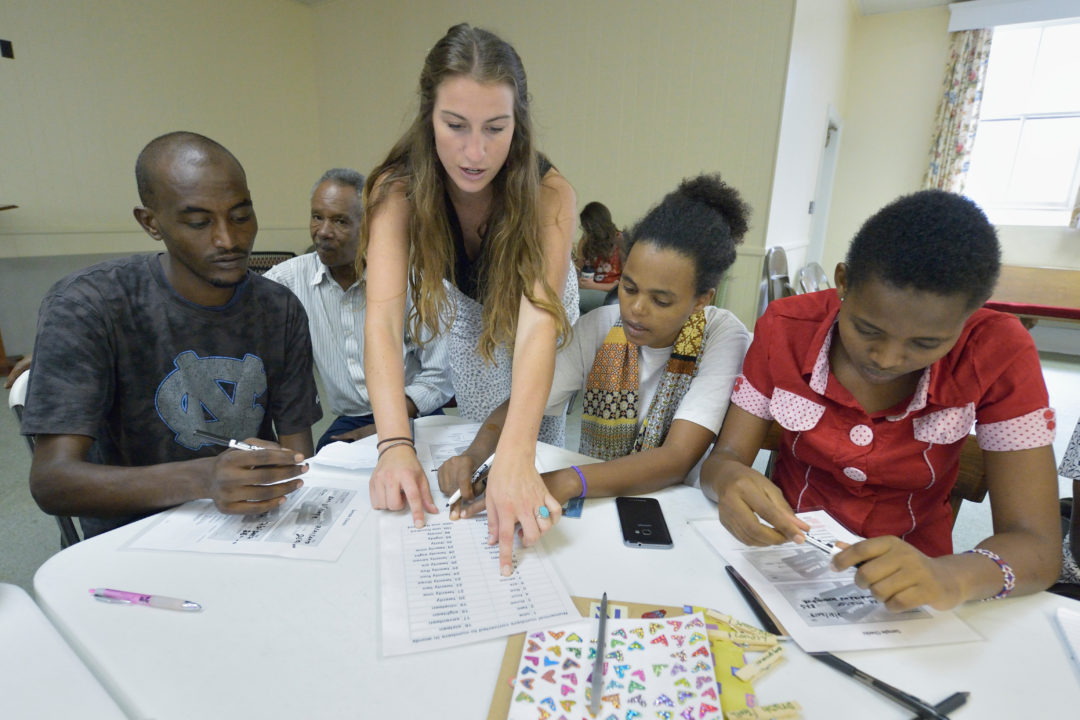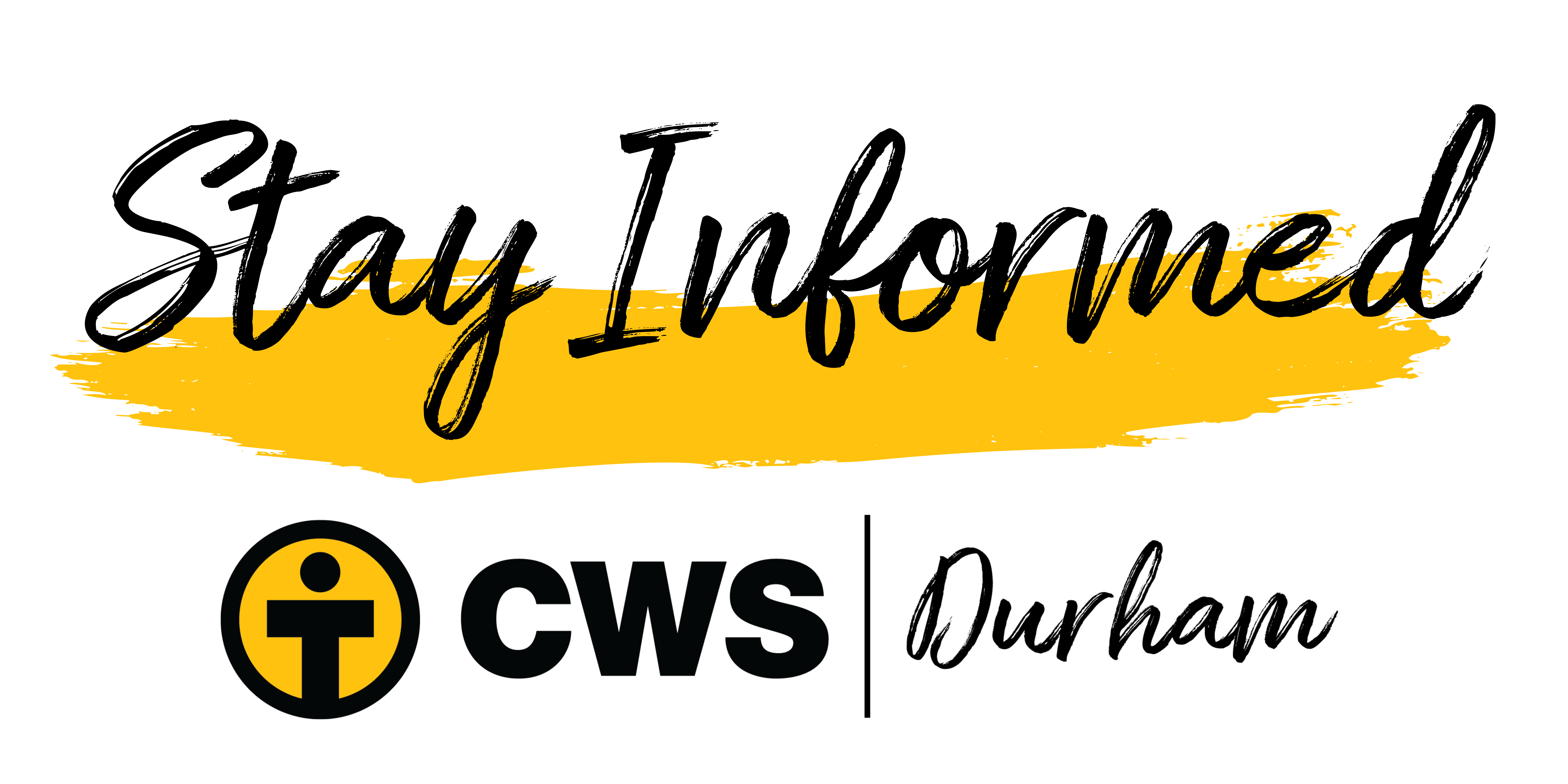
In the basement of a United Methodist Church in Durham, Julia Hause helps newly arrived refugees learn financial skills, including how to write checks. Photo by Paul Jeffrey for Church World Service.
Written by Julia Hause
9:58, 9:59, 10:00. I look up from my desk, which faces the front door of our office. Bright, smiling faces greet me on the other side of the door as I open the office to clients for our daily walk-in hours. Here, I answer questions ranging from ‘How do I pay my electricity bill?’ to, ‘I need help finding employment, but I am struggling to find childcare for my young children so that I can go to work.’ The day rolls on with expected client visits, as well as many unexpected visits that present spontaneous tasks and conversations.
I first started working with refugee clients in the area of employment when I served as an AmeriCorps member with CWS Durham for one year. As that year wrapped up, I began working on the TAP-F program as an Employment Specialist because I couldn’t begin to imagine leaving my empowering, inspiring, and diverse clients and colleagues. The TAP-F program objective is to offer long term services and support to those refugee clients with developed English comprehension skills, professional careers that were left behind in their home counties, academic degrees, and/or highly skilled trades. Not every client will be placed in their dream job or desired field immediately, but the TAP-F program provides clients with the necessary tools, resources, experience, practice and skills to be a competitive candidate in the job market and re-enter their desired field as quickly as possible.
The Migration Policy Institute’s report, “Untapped Talent: The Costs of Brain Waste Among Highly Skilled Immigrants in the United States,” explains the phenomenon of “brain waste,” or skill underutilization, and identifies that there is an estimated nearly 2 million highly skilled and educated immigrants living in the U.S. that are underemployed working in low skill jobs, or unemployed. Brain waste is a reality that plaques most of our communities in this country, affecting individuals’ earnings, tax contributions, upward mobility, wealth building, and community economic growth. Through our professional development program at CWS Durham, we aim to reduce the brain waste in our communities by serving our clients in their long-term efforts to obtain career-specific employment and improve the economic situations of themselves and their families.
After the office clears, I meet with a client for a TAP-F enrollment intake. I sit down with this client, who has years of experience as a practicing physician in her home country. Her English has developed tremendously over the two years she has lived in Durham, and I admire her for all the work she has put into practicing and studying the language in the hope that English proficiency will be her ticket back into the medical field. It is a brutal reality to transition from practicing medicine internationally to serving at hotel banquet events. The last time we worked together, which was two years ago, we attended a job interview and she was rejected for a position because her English skills were not strong enough. Ironically, this was at the same hotel that she now works, and thrives at. We discuss her options for programs at CWS that can provide additional support and direction in achieving her career goals: to become a Nurse. She recognizes that she probably will never practice medicine the way she used to—a reality that many highly achieved persons who migrate to the U.S. must settle with. Attending Nursing school, which is an alternative career pathway for many former doctors, will give her an opportunity to still help people, and work in the familiar environment of the medical field. Together we discuss short and long-term goals and the necessary steps to achieve them. By the end of our meeting she is enrolled in the TAP-F program where I can support her through a mentorship program, upward mobility opportunities, recertification efforts, community connections, resources on advanced financial education and workshops to sharpen skills in the areas of resume building, cover letters, networking, leadership, entrepreneurship, and vocational education opportunities. With the support of TAP-F, in two more years she could be back in the medical field and on her way toward even greater career goals!
If you’re a community member looking to get involved and working with highly skilled refugee clients would be a good fit for you, please consider applying to become a CWS volunteer, and identify in your application that you would like to be a Mentor. Do you own a business, or work for a company that would like to hire bright, and diverse talent? Please contact me about our On-the-Job Training program to get clients connected and working in their desired fields (Healthcare, IT, Engineering, Teaching, Business, Entrepreneurship, Logistics, etc.) through supported On-the-Job services. Thank you!
Contact information: Julia Hause 919-759-1496; jhause@cwsglobal.org

